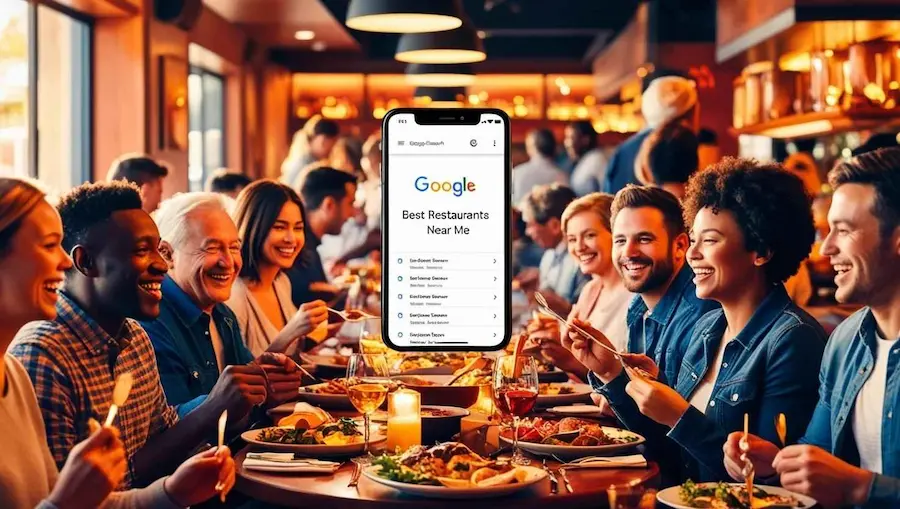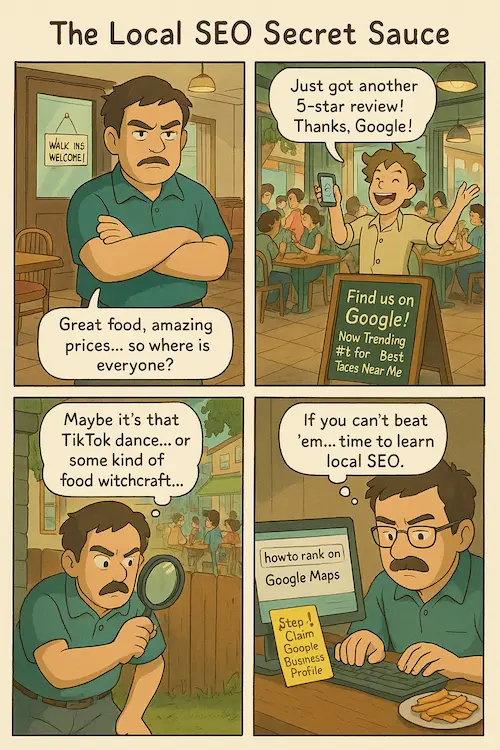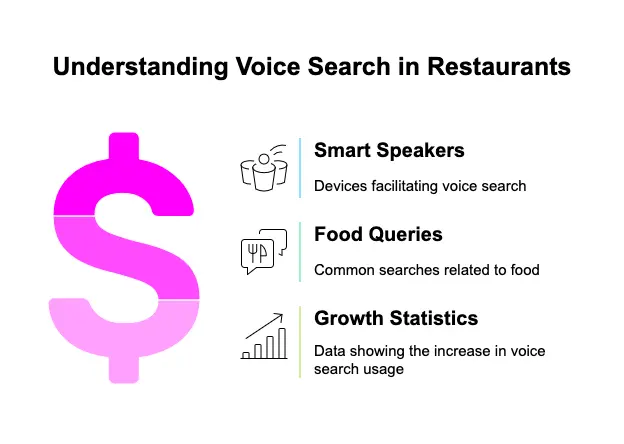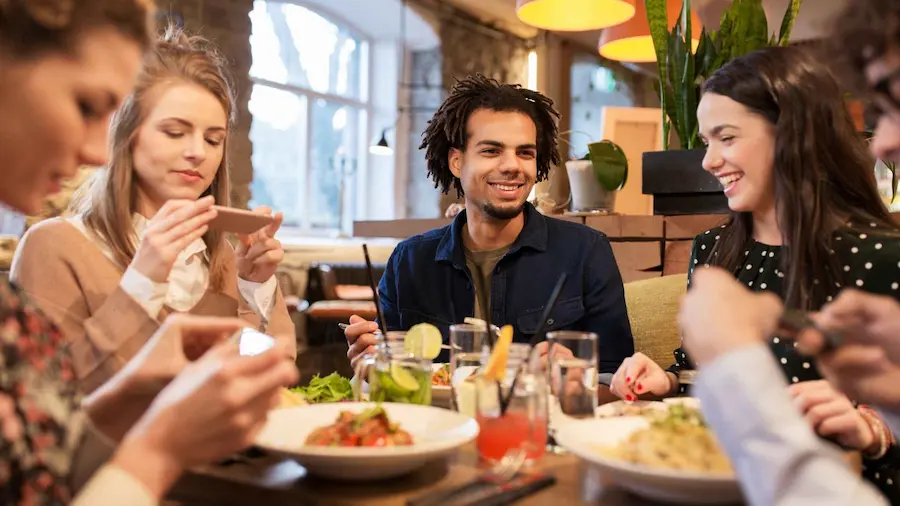Let’s start with a quick story. A few years ago, a friend of ours opened a cozy little Italian spot in downtown Austin. Amazing food, great vibe—yet, for months, they struggled to fill seats. Then, they made one simple change: they optimized their Google My Business profile. Within weeks, reservations started rolling in.
That’s the power of Local SEO—the difference between empty tables and a packed house.
Most restaurants focus on flashy Instagram ads or word-of-mouth (which does matter), but they sleep on the #1 way customers find them: local search. According to Google, 46% of all searches have local intent, and “near me” queries have skyrocketed by 250% in the last few years.
So, if you’re running a restaurant and not prioritizing Local SEO, you’re leaving money on the table.
Here’s the good news: You don’t need a fancy agency or a $5,000/month ad budget. You just need to know the secrets most restaurants miss.
1. Your Google Business Profile Is Your Digital Storefront (Treat It Like One)
Imagine this: A hungry customer searches “best burger near me.” Google shows three options. One has blurry photos, incomplete hours, and two outdated reviews. Another has crisp images, a menu link, and 50 glowing reviews. Which one do you think they’ll pick?
Exactly.
What Most Restaurants Get Wrong:
- They set up their GBP (Google Business Profile) once and forget it.
- They ignore Q&A sections, leading to outdated info.
- They don’t post updates (events, specials, etc.).
What You Should Do Instead:
✔ Optimize Every Detail – Hours, phone number, menu link, attributes (like “outdoor seating” or “gluten-free options”).
✔ Post Regularly – Share weekly specials, events, or behind-the-scenes content (Google rewards active profiles).
✔ Encourage Reviews (But Never Buy Them) – A study by BrightLocal found 87% of consumers read online reviews before choosing a restaurant. Politely ask happy customers to leave feedback.
Pro Tip: Respond to every review—good or bad. It shows you care.

Elevate Your Digital Presence
Ready to transform your content strategy? Our expert team delivers SEO-optimized blogs and powerful backlink strategies that drive real results.
Boost Your Content Strategy →2. “Near Me” Keywords Aren’t Enough—You Need Semantic SEO
Sure, you want to rank for “best pizza in [city].” But Google’s smarter than that. It looks for context.
For example:
- Instead of just “Italian restaurant Chicago,” try:
- “Authentic handmade pasta downtown Chicago”
- “Romantic Italian spot for date night near Lincoln Park”
Why? Because people don’t just search “restaurant near me.” They search with intent.
How to Find Goldmine Keywords:
- Use Google Autocomplete (start typing your niche + city and see what pops up).
- Check “People also ask” sections in search results.
- Spy on competitors’ websites (tools like Ubersuggest or AnswerThePublic help).
3. Local Backlinks Are Like Word-of-Mouth on Steroids
Backlinks (links from other sites to yours) tell Google: “This place is legit.” But most restaurants only have a few—usually from Yelp or TripAdvisor.
How to Get More (Without Paying):
✔ Partner with Local Bloggers – Invite food influencers to try your menu in exchange for an honest review.
✔ Get Listed in Local Directories – Not just Yelp, but niche sites like Eater, The Infatuation, or city-specific guides.
✔ Sponsor Community Events – Local news sites often link to sponsors.
Real Example: A bakery in Portland got featured in a local “Best Desserts” roundup—traffic to their site jumped 200% in a month.

4. Speed Matters (No One Waits for a Slow Website)
Here’s a harsh truth: If your site takes longer than 3 seconds to load, 53% of visitors bounce (Google data). And guess what? Google penalizes slow sites in rankings.
Quick Fixes:
- Compress images (use TinyPNG or ShortPixel).
- Ditch heavy themes—go for simple, mobile-friendly designs.
- Use a fast host (SiteGround, WP Engine).
Funny Story: A sushi place in Miami had a gorgeous, animation-heavy website… that took 8 seconds to load. After speeding it up, their online orders doubled.
5. Voice Search Is Coming—Are You Ready?
“Hey Siri, find a brunch place with bottomless mimosas near me.”
Voice searches are growing fast (by 2025, 75% of households will own a smart speaker). And they’re way more conversational.
How to Optimize:
- Use long-tail, natural phrases in your content (e.g., “Where can I get vegan tacos in Austin?”).
- Add a FAQ section with spoken-style questions.
- Ensure your NAP (Name, Address, Phone) is consistent everywhere.

Final Thought: Local SEO Isn’t a One-Time Fix
The restaurant that dominates local search isn’t the one that does a single update and forgets it. It’s the one that treats SEO like daily kitchen prep—consistent, intentional, and always improving.
So, start small. Fix your GBP today. Get a few reviews. Speed up your site. The results? More hungry customers at your door.
And hey, if you try these tips and see a difference, let us know. We’d love to hear your story.
(Now, if you’ll excuse us, all this talk about food has us craving a burger… and yes, we’ll be Googling “best burger near me.”)
FAQs
Why does SEO matter for restaurants and how can it improve local ranking?
SEO matters for restaurants because it helps potential customers find your business when they search for restaurants online. When your restaurant ranks higher in local search results, you significantly increase visibility and foot traffic. Effective restaurant SEO strategy can put your business in front of hungry customers at the exact moment they’re looking to dine out. With 76% of people who search for a local business on their smartphone visiting that business within 24 hours, optimizing your online presence directly translates to new customers walking through your door. Proper search engine optimization also builds credibility and trust with potential customers who rely on Google search to make dining decisions.
What are the most effective restaurant SEO tips to help improve local visibility?
The most effective restaurant SEO tips include: optimizing your Google My Business listing with accurate business information, hours, and high-quality photos; building a mobile-friendly website with local keywords; creating location-specific content; managing online reviews; implementing schema markup for restaurant information; maintaining consistent NAP (Name, Address, Phone) across all platforms; optimizing for voice search with conversational keywords like “Italian restaurant near me”; using social media platforms to boost visibility; and creating a content strategy that includes local events, seasonal menus, and behind-the-scenes stories that help your restaurant stand out while improving search rankings.
How important is Google My Business for local restaurant SEO?
Google My Business is absolutely crucial for local restaurant SEO. It’s often the first impression potential customers have of your restaurant when they search for restaurants in your area. A complete and optimized GMB profile significantly improves your chances of appearing in Google’s “Local Pack,” Maps results, and local search rankings. Make sure to verify your business, provide accurate contact information and business hours, add high-quality food photos, respond to reviews, post updates about specials or events, and include your menu. Restaurants with complete GMB listings receive 7x more clicks than those with incomplete listings, making it one of the most powerful tools in your restaurant SEO efforts.
What on-page SEO techniques should I implement on my restaurant website?
For effective on-page SEO, optimize your restaurant website by incorporating local keywords naturally throughout your content, meta descriptions, and image alt tags. Create dedicated pages for each location if you have multiple restaurants. Include schema markup to help search engines understand your business hours, menu items, and pricing. Ensure fast loading times and mobile responsiveness since many restaurant searches happen on smartphones. Include an embedded Google Map on your contact page. Create unique, detailed content about your cuisine, chef, ingredients, or neighborhood. Add high-quality images with proper alt text. Include easy online ordering functionality if applicable. Finally, make sure your NAP (Name, Address, Phone) information is consistent across all pages.
How can I optimize my restaurant for Google Maps and local searches?
To optimize your restaurant for Google Maps and local searches, start by claiming and fully completing your Google My Business profile with accurate business information, hours, photos, and services. Use local keywords in your business description. Encourage satisfied customers to leave positive reviews and respond professionally to all reviews, both positive and negative. Add geo-modified keywords throughout your website (like “best Italian restaurant in [neighborhood]”). Build local backlinks from community websites, local news outlets, and business directories. Create location-specific content highlighting local events or suppliers. Ensure NAP consistency across all online platforms. Include a map on your website and implement local business schema markup to boost your local ranking in search engine results.
How can I use social media to boost my local SEO for my restaurant?
Social media platforms are powerful tools to boost your local restaurant SEO. Start by creating and maintaining active accounts on platforms where your customers spend time like Instagram, Facebook, and TikTok. Consistently post high-quality food photos, behind-the-scenes content, and promotions. Use location tags and local hashtags in your posts to increase local visibility. Encourage customers to check in and tag your restaurant in their posts. Share user-generated content to build community. Cross-promote with other local businesses to expand your reach. Include your website link in all profiles and posts when relevant. While social signals aren’t direct ranking factors, the increased visibility, engagement, and traffic they generate significantly contribute to your overall restaurant SEO strategy.
What role do online reviews play in local SEO for restaurants?
Online reviews are extremely influential for local restaurant SEO and customer decision-making. Positive reviews improve your local ranking factors in Google’s algorithm, with review quantity, diversity, and recency all playing a part. In fact, 91% of diners check online reviews before choosing a restaurant. To leverage reviews for SEO: actively encourage satisfied customers to leave reviews; respond professionally to all reviews (positive and negative); incorporate review management into your restaurant marketing strategy; address negative feedback promptly and constructively; and monitor review sites beyond just Google (Yelp, TripAdvisor, Facebook). A steady stream of positive reviews signals to search engines that your restaurant is trustworthy and relevant, helping you outrank competitors in local search results.
How can I track the success of my restaurant SEO efforts?
To track your restaurant SEO efforts, use Google Analytics to monitor website traffic, user behavior, and conversion metrics like online reservations or ordering. Google Search Console helps identify which keywords drive visitors to your site and how your restaurant appears in search results. Track your local ranking for key search terms like “Italian restaurant near me” or “best [cuisine] in [location].” Monitor Google My Business insights to see how customers find your listing and what actions they take. Keep an eye on review quantity and sentiment across platforms. Compare your online presence to competitors. Set up conversion tracking to see if website visitors are taking desired actions like making reservations. Finally, track phone calls from your website to measure how many searchers become customers. These metrics will help refine your restaurant SEO strategy over time.
